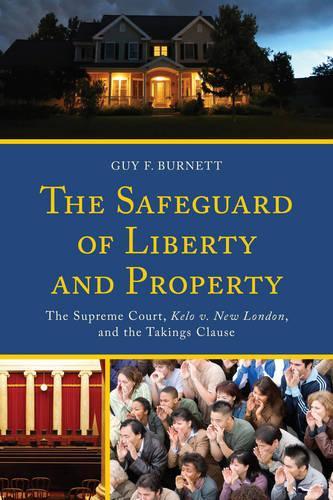
The Safeguard of Liberty and Property: The Supreme Court, Kelo v. New London, and the Takings Clause
(Paperback)
Available Formats
Publishing Details
The Safeguard of Liberty and Property: The Supreme Court, Kelo v. New London, and the Takings Clause
By (Author) Guy F. Burnett
Bloomsbury Publishing PLC
Lexington Books
14th November 2016
United States
Classifications
Professional and Scholarly
Non Fiction
Local government law
Legal systems: courts and procedures
346.730432
Physical Properties
Paperback
176
Width 151mm, Height 230mm, Spine 12mm
268g
Description
In 2005, the Supreme Court ruled in Kelo v. New London that a city might take property from one private owner and transfer it to another for economic redevelopment. The ruling marked a new interpretation of the Fifth Amendment to the Constitution, and set a precedent which has raised significant questions regarding government takings and property rights. The ruling also reawakened a public interest in private property and created a vicious reaction among many citizens, journalists, academics, and legislators. This book is unique because it offers an in-depth analysis of the case law found in the opinions and decisions of the state and federal courts, but also uses a variety of other sources including the oral argument before the Supreme Court, the amicus curiae briefs, American political and legal history, as well as the personal stories of those involved in the case. This book also analyzes the public backlash from several different perspectives including opinion polls, media coverage, academic articles and commentary, subsequent case law, and legislative action. Finally, this book offers an insightful critique of the case, including what the Supreme Court got wrong, what it got right, and where the law and courts should go from here.
Reviews
In this in-depth examination of Kelo v. New London, 545 U.S. 469 (2005), Professor Guy F. Burnett provides an interesting, well-written illustration of Supreme Court commentator Jeb Rubenfelds claim that takings law (along with the right to privacy) is the area of constitutional doctrine most in need of a principle.... The Safeguard of Liberty and Property excels in its thought-provoking and thorough comparison of these opinions. This case study concludes by examining reactions to the Courts decision, and raises important questions about the cases legacy, constitutional interpretation, and the popular perception of property law in the modern United States. * The Harvard Law Review *
This highly accessible volume about the US Supreme Courts 2005 eminent domain decision in Kelo v. New London. . . .has succeeded in producing an academic treatment whose objectivity and focus on constitutional law and politics (as distinct from the public policy ramifications of the decision) set the book apart from others on the subject. In clear and well-organized prose, Burnett leads readers through the legal complexities of the case, addressing the origins of the lawsuit, the various stages of the Supreme Court litigation, and the multi-faceted 'backlash' to the decision. The Safeguard of Liberty and Property will be a valuable and well-received addition to reading lists of undergraduates interested in the Supreme Court, judicial decision making, and constitutional law. Summing Up: Highly recommended. General readers and undergraduate students. * CHOICE *
The Takings Clause of the Fifth Amendment declares that no private property shall be taken for public use, without just compensation. In this well-researched book, Burnett provides an in-depth case study of Kelo v. City of New Londonthe highly-controversial 2005 decision in which the Supreme Court completed the process of reading public use out of the Constitution and replacing it with public purpose. Burnett expertly sets the stage by thoroughly discussing the litigation at the state court level in which Susette Kelo valiantly fought to protect her house from the citys power of eminent domain. He then explores the legal arguments advanced before the Supreme Court as found in the merit and amici briefs and as presented in the oral argument before masterfully analyzing Justice Stevenss majority opinion, Justice Kennedys concurrence, and the dissents by Justices OConnor and Thomas. He finishes by exploring the impact of Kelo on subsequent litigation and the legislative reaction to it at the federal, state, and local levels. Burnetts elucidation of the Courts evolving interpretation of public use over the past century clearly shows how precedent can easily erode the original meaning of language that was understood to be a bedrock protection of private property. This book deserves a wide readership. -- Ralph A. Rossum, Claremont McKenna College
Guy F. Burnett has done an enormous favor for political scientists, lawyers, and concerned citizens by placing the Constitutions Takings Clauseand the Supreme Courts controversial decision in the Kelo casein the full context of the Founders Constitution and American legal history. His account is at once erudite and highly readable. -- Bradley C. S. Watson, Saint Vincent College
Author Bio
Guy F. Burnett is assistant professor of government and foreign affairs at Hampden-Sydney College in Virginia.
